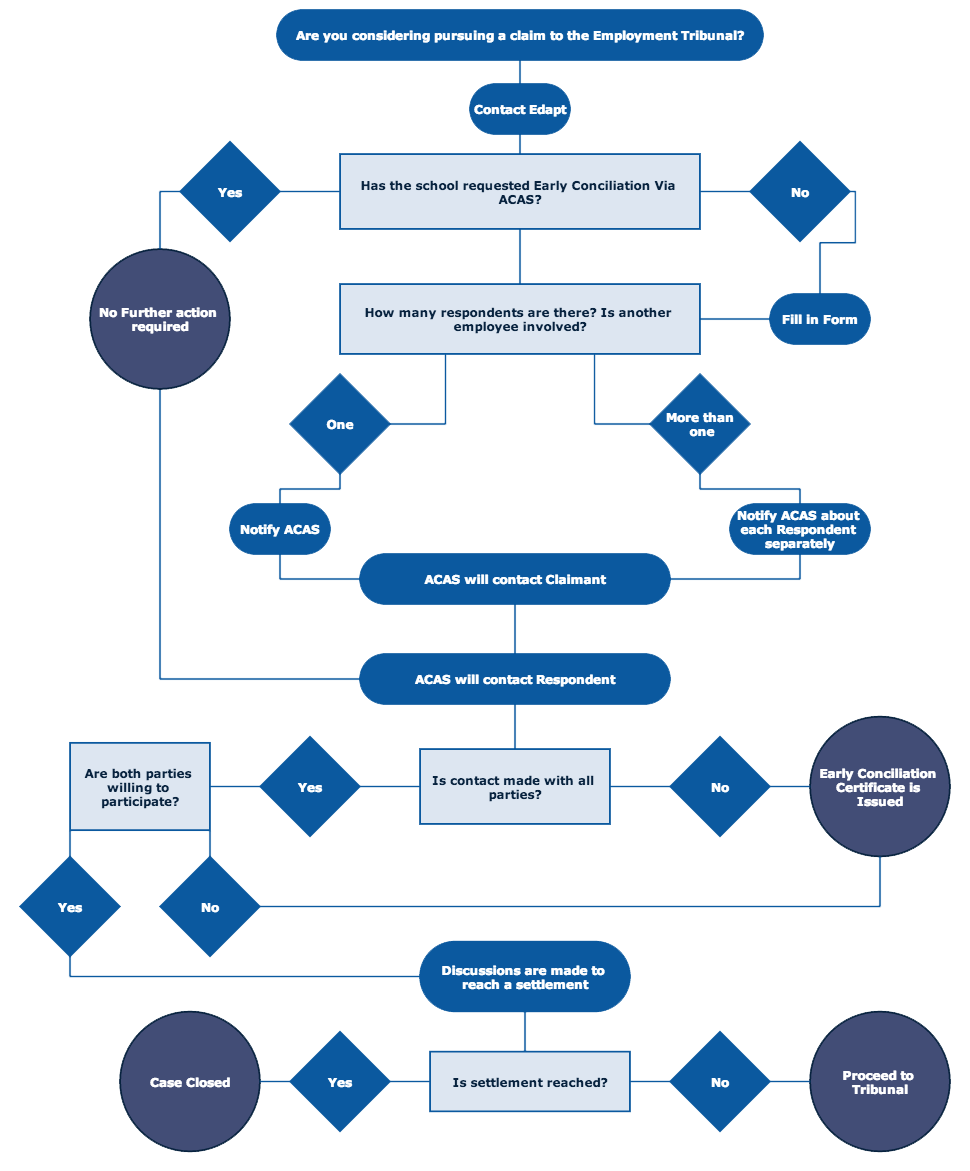What is Early Conciliation?
Early Conciliation came into force on 6 April 2014 meaning that any teacher or school employee will need to notify ACAS in the event they intend to pursue an Employment Tribunal claim against their school or local authority. There are very limited exceptions to this and most types of claim will be subject to this process.
Edapt has created the flow chart below to help you understand the process should you be wishing to pursue a tribunal claim.
Who are ACAS?
ACAS is the Government funded Advisory, Conciliation and Arbritration Service that works with both employers and employees to resolve employment relations disputes. You can find out more at www.acas.org.uk
What do I need to do?

The teacher or school employee (the Claimant) will need to complete a form which will contain only the name of the employer and their contact details but no information about the potential claim.
A frequent issue in schools’ cases is identifying the correct employer be it the Governing Body or Local Authority and ensuring you have the correct contact details. Whilst there is some scope for Tribunals to accept claims where the wrong Respondent has been named it is better to get ensure it is right rather than relying on the discretion of the Tribunal.
If there is more than one potential Respondent to the claim, then the teacher or school employee will need to notify ACAS separately about each of them by submitting additional notifications. This often occurs in cases of discrimination where the school is the employer but a discriminatory act has been committed by another employee. If the Respondent (the employer) has already contacted ACAS about the proposed claim then you will not need to notify ACAS. This is one of the few exceptions to the Early Conciliation process.
Once the notification is made ACAS will make first contact with you within 2 days to ensure you consent to them contacting the Respondent. At present it is understood that first contact will be with you directly whether or not you have named a representative within the notification, though you will be able to ask ACAS to contact your representative to further discussions. Contact will then be made with the Respondent with a view to discussing the potential claim and trying to reach settlement.
If no contact can be made or neither party wants to participate in Early Conciliation a certificate will be issued permitting the employee to issue a Tribunal claim. You will not be able to issue a claim without the certificate. The process allows an extension of time to issue a Tribunal claim provided that the claim was in time to start with. There is a possibility of an extension up to one month and this may be extended further if the ACAS Conciliation Officer believes that there is a reasonable prospect of settlement. Be aware though that the time limits for bringing a claim are strictly adhered to by the Tribunal and the new provisions are not straightforward. If you miss the deadline you may not be able to bring your claim so ensure that you seek advice first.
As this process is going to be compulsory and is free, it could be a useful way to try and resolve your claim early. It is important though that you understand your case and its potential value before entering into an agreement to settle your claim. Settlements via ACAS known as COT3 Agreements are legally binding once you have agreed to them even over the telephone. ACAS are an independent service and do not offer legal advice. They will not advise you as to whether any offer of settlement is appropriate in your case.
If as an Edapt subscriber you are considering contacting ACAS because you want to pursue a tribunal claim please contact Edapt for advice, assistance and/or representation before taking any action.
—————————————————————–
Edapt is a trade union alternative providing individual support and protection for teachers in allegations and employment issues.
Subscribe to Edapt today from as little as £8.37 per month to get access to high quality edu-legal support services to protect you in your teaching and education career.
SubscribeLatest Support Articles
Our support articles provide up to date advice on a wide range of topics including pay and conditions, maternity and paternity, dealing with allegations and staying safe online.
